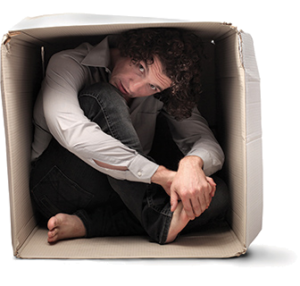Awkward in Social Situations?
Attention Magazine February 2022
 What does “feeling awkward” in social situations mean to you? It may mean that you avoid direct eye contact, hesitate to initiate a conversation, feel uncomfortable in your own skin, or question every move you make.
What does “feeling awkward” in social situations mean to you? It may mean that you avoid direct eye contact, hesitate to initiate a conversation, feel uncomfortable in your own skin, or question every move you make.
Do you find that your anxiety is palpable as you latch onto one friend and wish for the social event to be over?
Socializing well may come naturally to some, but it sure doesn’t come easily to others. And if you’re like many adults with ADHD, you may find social situations a challenge.
Do you wonder whether you are introverted, socially awkward, or socially anxious? Being introverted is not the same as being socially awkward. Introverts may relish their alone time and may be seen as alert and observant.
Social awkwardness is similar to social anxiety in that they both indicate social situations induce anxiousness or stress. A socially awkward person may feel shame and isolated. They tend to be invited less often than their socially confident counterparts, so their self-confidence may start to spiral downward, too. The longer this struggle goes on, research tells us, the harder it is to move past this struggle.
The good news is that social skills, just like any other life skill, can be practiced and improved at any age. The less-good news is that if awkwardness is not successfully addressed, it does not improve on its own.
What to Do When You Feel Socially Awkward
- Be intentional with your body language.
Make eye contact as you enter a conversation, and practice having a stance that is present and expresses friendly intentions: shoulders back and using a calm, pleasant tone of voice. This is preferable by far to stance that is frantic and overly intense or one that telegraphs how uncomfortable you are. Practice this physical pose and design a “pre-game” that allows you to prepare your mental state as you remember your strengths, kindness, and character. - Assess your surroundings.
Being socially awkward is often due to forgetting social expectations and failing to take a bird’s-eye view of the event. Take a deep breath. “Zoom out” to look at a social interaction broadly, and then “zoom in” to pause and notice details such as the social cues and messages other people send through their body language. - Watch for social cues.
Research shows that people who are socially awkward have difficulty reading social cues. Nonverbal information consists of messages alerting you on how to react and adapt in a social interaction. Practice guessing what different social cues mean by turning your television’s sound off, or try using Social Spy on people at a mall, coffee shop, or store. Take special note of small social indicators, such as a rapid head nod (meaning someone is done with a conversation), a shoe pointed outward (meaning someone wants to leave), or someone edging away from the other person (meaning the person wants to leave or change the topic of conversation). - Do something you excel at.
Use your “superpowers”—your strengths—to engage socially. Are you gifted athletically? A computer whiz? A natural event planner? Join an activity or volunteer using your strengths. This puts you into new social situations as an “equal” and moves you out of your comfort zone. Practice physically moving around in the group, making eye contact, noticing your body, and focusing on your positive self-esteem. - Break social interactions into steps.
Don’t shy away from social occasions, holidays, events, and dinners. Use Social Spy to interpret how others interact and what they might be feeling. It isn’t your fault that social situations end up being painful. Practice taking little steps to build up your self-confidence. Consider breaking down the steps to making a friend to simplify the process of connecting with another person. This can help demystify the process and make it less intimidating and less complicated. - Practice making chit-chat.
Knowing that you can bridge from one topic to another and make conversation is not just an art, it’s a necessity. Chit-chat and conversation help us connect with people and develop and nurture friendships. - Change your self-talk.
Everyone has made a socially awkward mistake at some point. Be gentle with your self-talk and get back on the horse. More than likely, your faux pas weren’t even noticed. - Pay attention to personal hygiene.
First impressions are critical. Hygiene can affect your mental health and social and physical life. Not only does washing hands protect against gastro or infectious diseases such as COVID-19, colds, and flu, but it also prevents spreading diseases to other people. - Rehearse.
Practice these steps with family members or at a party with close friends. Rehearse walking up to someone or physically joining a group, saying hello, and adding to a conversation. - Be part of the community.
Join activities and pick places where you can meet people, cultivate relationships, and practice key skills. Every day presents opportunities to reach out to others and engage. Practice with people you are comfortable with first, in order to grow in confidence and build social skills.
IT TAKES TIME TO STEP OUT OF YOUR COMFORT ZONE, but if you go forward with a slow and steady pace, you will do it. Go at your own pace so you don’t get overwhelmed. Be patient, and give yourself a high-five!


 Caroline Maguire, M. Ed, ACCG, PCC, earned her master’s degree with a specialization in social emotional learning from Lesley University. She is the author of the award-winning book,
Caroline Maguire, M. Ed, ACCG, PCC, earned her master’s degree with a specialization in social emotional learning from Lesley University. She is the author of the award-winning book,